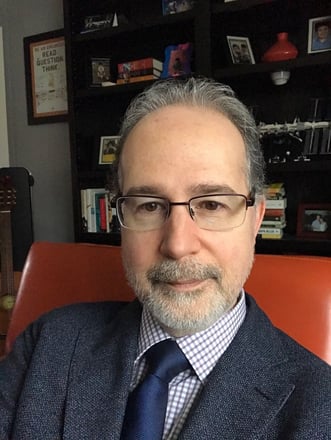The Risk-Reward Proposition in Science and Dedicating Life’s Work to Improving the Human Condition
Marco Baptista’s love of science seems to have no limits. In fact, he took it to outer space a couple of years ago  when he was helping his son’s kindergarten class track the International Space Station.
when he was helping his son’s kindergarten class track the International Space Station.
“At the time, I was working with a gene known to be connected with Parkinson’s disease,” says Baptista. “While I was doing the space station project with my son, it occurred to me that the microgravity in space might be able to crystalize the gene, something that was difficult to do on earth.”
Crystallization would allow scientists to see the gene’s structure more clearly. Through a contact at his position with the Michael J. Fox Foundation, he was able to make the experiment happen.
“It didn’t get the kind of resolution we were looking for, but it was still a tremendous experience to come up with the idea and carry it out,” says Baptista. “To me, that’s what it’s all about — taking risks even if not all of them work.”
Baptista first discovered his passion for science as a psychology major at the University of Toronto, where he studied the reward pathways of the brain via electrical brain stimulation. He went on to earn a Ph.D. in neuroscience from McMaster University, studying the molecular basis of drug tolerance.
“Science opened up my mind to so many exciting things about the body, the different types of dysfunctions that can occur and ways to treat them,” said Baptista, who grew up in Canada and now lives in New Jersey with his wife and two sons. “It was almost like science fiction to me. It really is incredible what we can learn.”
After completing his postdoctoral research at Scripps Research in La Jolla, California, Baptista spent five years in the pharmaceutical industry working at Schering-Plough, which was bought by Merck in 2009. He was tasked with building a preclinical program around LRRK2, a major genetic mutation that can increase the chances of developing Parkinson’s disease, and the same gene he later sent into space. In 2012, he joined the Fox Foundation as Associate Director of Research Programs, and the opportunity changed the trajectory of his career.
“It was an eye-opener to me to go to the nonprofit world. It was more than just being exposed to the Fox Foundation’s work; it was suddenly realizing the power of a nonprofit and making direct connections to the patients whose lives depend on our work. It changed my view on the impact of what a nonprofit can do,” says Baptista. “The opportunities grew tremendously.”
Baptista worked closely with patients to understand their concerns and unmet needs. He uncovered obstacles that prevented researchers from developing therapeutics, and he formed collaborations between four large pharmaceutical competitors that would not have happened organically. Now, he is excited to bring that experience to the Reeve Foundation.
“I’ve been studying the central nervous system for my entire career, and a lot of the biology and therapeutic approaches for Parkinson’s and spinal cord injury are actually quite similar, including electrical stimulation, cell renewal and the potential for biomarkers to provide clues to the personalized therapeutic approaches that may help individual patients. The kind of impact I can make in the nonprofit space isn’t specific to Parkinson’s,” says Baptista. “The Reeve Foundation has such a tremendous reputation for both for care and facilitating research, and I’m excited to be part of its success moving forward.”
Baptista notes that another crossover between spinal cord injury and Parkinson’s is the need and potential for combined therapies.
“One pill, or one therapeutic approach won’t be the answer,” says Baptista. “These are complex injuries, and often, there is a primary injury with a cascade of secondary injuries. A solution will involve combining several different therapeutic processes.”
As he starts his new position as the Reeve Foundation’s Chief Science Officer, Baptista is prepared to hit the ground running.
“Our first step is to assess and facilitate a robust pipeline with a lot of clinical trials going on at the same time,” says Baptista. “I want to understand where researchers feel there are bottlenecks so we can start forming scientific roadmaps.”
He hopes that by identifying the obstacles and opportunities, he can bring researchers together who might not usually be communicating. It is important to connect researchers doing similar work as early as possible.
“In my experience, breakthroughs occur when groups start talking, sharing data and physically sharing research pieces — that’s when things really happen,” says Baptista. “In the end, I’m not here to break the code. I’m here to facilitate our larger community to break the code together. It’s a top-down and bottom-up approach.”
He also wants to replicate his previous success with industry collaborations.

 when he was helping his son’s kindergarten class track the International Space Station.
when he was helping his son’s kindergarten class track the International Space Station.